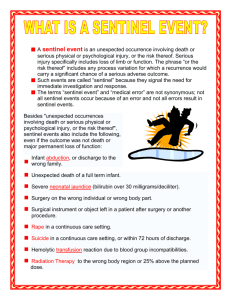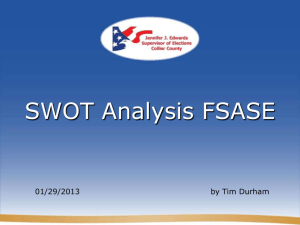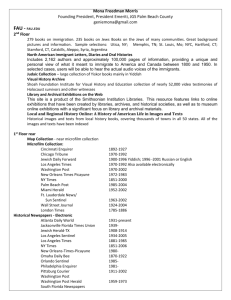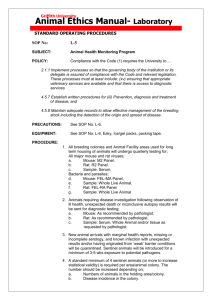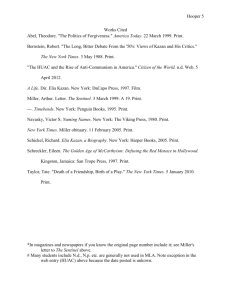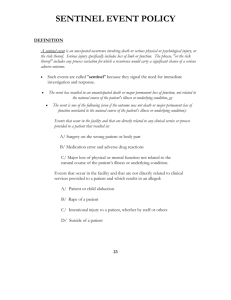Sentinel Career Center - Vanguard-Sentinel Career and Technology
advertisement
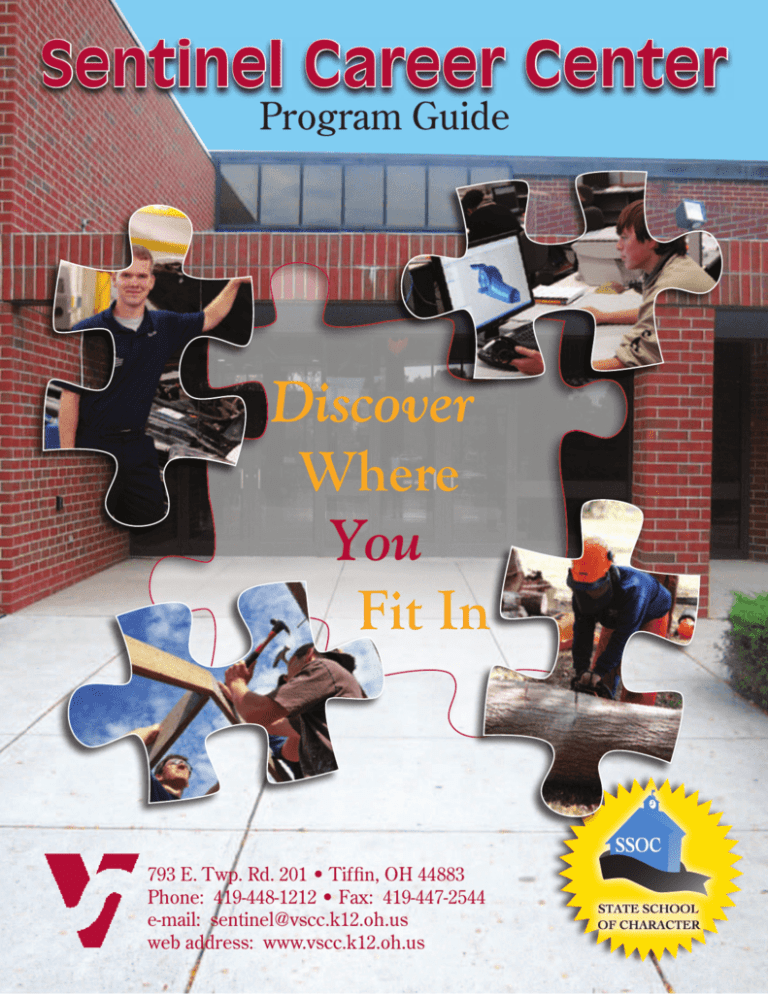
Sentinel Career Center Program Guide Discover Where You Fit In 793 E. Twp. Rd. 201 • Tiffin, OH 44883 Phone: 419-448-1212 • Fax: 419-447-2544 e-mail: sentinel@vscc.k12.oh.us web address: www.vscc.k12.oh.us Sentinel Career Center Sentinel Career Center is committed to providing the future workforce with essential skills to become successful citizens. Our curriculum offers programs and opportunities for high school students to develop technical and employment skills, while earning credits for high school graduation. Students may earn college credits based on their performance at Sentinel. Some of Sentinel’s programs are College Tech Prep which provide dual enrollment with Terra State Community College, and allow students to earn free college credits while still in high school. This booklet provides an overview of the opportunities available for high school students at Sentinel Career Center. In addition to descriptions of individual programs taught at Sentinel are answers to many of the more common questions regarding employment assistance, college and technical school training, participation in extracurricular activities, and application procedures. Sentinel offers quality programs that give students their best opportunity to prepare for the realities of “life after high school”. We are proud of our current and past students, proud of employment levels of our recent completers, and proud of the many Sentinel students who go on to higher education. Students who successfully complete a Sentinel career program are well prepared and have credentials to succeed at the next level–in the workforce, in college, or in the military. Although most students will tour Sentinel with their classmates, we extend an open invitation to every student and their parents to visit Sentinel at any time. CHARACTER COUNTS AT SENTINEL Since the 2000-2001 school year, Sentinel Career Center has integrated character education into its’ culture. Business personnel, parents, former students, teachers, and administrators strongly believe this is an essential component to develop a well-rounded individual. Employers desire to hire employees who possess not only career and technical skills, but also “soft” skills which are needed to succeed in the employment field. Our foundation for the program is based on the six pillars of “Character Counts”. The core values of trustworthiness, respect, responsibility, fairness, caring, and citizenship are an integral part of the character education curriculum. The entire staff at Sentinel is expected to model good character, and this practice of good character is expected from students as well. Students feel comfortable at Sentinel because of the caring and safe environment that has been established. Classes work together in team-building activities, service learning, and youth organizations to create a sense of unity and belonging within the building. There are many opportunities where students can “discover where they fit in” as a means to demonstrate good character. Students, parents, and community leaders recognize the high standards that Sentinel sets for the development of high-quality citizens for a better workforce. The staff at Sentinel continually strives for excellence in teaching character as a means to help our students become productive citizens upon graduation. Trustworthiness Respect Responsibility Fairness Caring Citizenship TABLE OF CONTENTS Page Facts About Sentinel------------------------------------------------------------------------------------------------------------------ 2 Application to Sentinel---------------------------------------------------------------------------------------------------------------- 3 Visiting Sentinel------------------------------------------------------------------------------------------------------------------------ 3 Sentinel Programs and Career Clusters----------------------------------------------------------------------------------------- 3 Academy of Business ---------------------------------------------------------------------------------------------------------------- 4 Agricultural Science and Technology--------------------------------------------------------------------------------------------- 5 Automotive Technology--------------------------------------------------------------------------------------------------------------- 6 Building/Construction Trades------------------------------------------------------------------------------------------------------- 7 Careers in Education----------------------------------------------------------------------------------------------------------------- 8 Collision Repair Technology-------------------------------------------------------------------------------------------------------- 9 Computer-Aided Design------------------------------------------------------------------------------------------------------------- 10 Computer Communications/Network Technician------------------------------------------------------------------------------ 11 Cosmetology---------------------------------------------------------------------------------------------------------------------------- 12 Electrical Trades----------------------------------------------------------------------------------------------------------------------- 13 Food Service---------------------------------------------------------------------------------------------------------------------------- 14 Horticulture------------------------------------------------------------------------------------------------------------------------------ 15 Medical Technology------------------------------------------------------------------------------------------------------------------- 16 Precision Machining------------------------------------------------------------------------------------------------------------------- 17 Public Safety---------------------------------------------------------------------------------------------------------------------------- 18 Welding and Fabrication Technology--------------------------------------------------------------------------------------------- 19 Enrollment Policies-------------------------------------------------------------------------------------------------------------------- 20 Student Services----------------------------------------------------------------------------------------------------------------------- 20 Career/Technical Student Organizations---------------------------------------------------------------------------------------- 20 What About College?----------------------------------------------------------------------------------------------------------------- 21 Employment Assistance-------------------------------------------------------------------------------------------------------------- 21 Awards and Recognition------------------------------------------------------------------------------------------------------------- 21 FACTS ABOUT SENTINEL CAREER CENTER WHO MAY ATTEND SENTINEL? To enroll in a career program at Sentinel Career Center, eligible high school students must be enrolled in one of our eleven associate schools or an approved home-schooling program. Sentinel Career Center serves 11 school districts: ♦ ♦ ♦ ♦ Bettsville ♦ Hopewell-Loudon Calvert ♦ Mohawk Columbian ♦ New Riegel Fostoria ♦ ♦ ♦ ♦ Old Fort St. Wendelin Seneca East Upper Sandusky Any 9th through 12th grade student from Bettsville, Calvert, Columbian, Fostoria, and St. Wendelin may enroll in Agricultural Science and Technology. Any sophomore may enroll in Cosmetology for 3 years. All other programs are two years in length and are open to juniors and seniors. HOW MANY CREDITS WILL BE EARNED AT SENTINEL? Agricultural Science I and II students receive 1 1/2 credits each year. Agricultural Science III students earn 2 credits. Students in all other programs will earn 3 credits per year towards graduation. HOW MUCH TIME WILL BE SPENT AT SENTINEL? Morning Session: 8:10-8:25 - Opt. individual instruction/enrichment 8:25-11:10 - Required class and lab time Afternoon Session: 11:50-2:35 - Required class and lab time 2:35-2:50 - Opt. individual instruction/enrichment NOTE: The individual instruction and enrichment activity time is on a volunteer basis for students. Bus schedule arrival and departure times will be based on the required, regular class and lab times. 9th, 10th, 11th, and 12th grade Agricultural Science and Technology class times vary. HOW MUCH WILL IT COST? There is no tuition or entrance fee for students. There are expenses such as tools, uniforms, workbooks, lab fees, and club dues. Financial assistance is available. HOW ARE STUDENTS TRANSPORTED TO SENTINEL? Each associate school provides bus transportation to and from Sentinel. Permission to drive a vehicle to and from Sentinel is under the jurisdiction of the associate school and Sentinel administration. WILL STUDENTS RECEIVE A DIPLOMA FROM SENTINEL? Students who successfully complete a program at Sentinel will receive a Career Passport and a Certificate of Honors, Achievement, or Completion. Sentinel students will graduate and receive their diploma from their associate school. WHAT ABOUT SPORTS AND SCHOOL ACTIVITIES - CAN I PARTICIPATE IN THEM IF I ATTEND SENTINEL? YES! Sentinel students are encouraged to participate in their high school’s athletics, extracurricular activities, and club programs. Permission for early dismissal or administrative absences is given on days of games, pep rallies, performances, and other similar events. Equal Education Opportunity If any student or staff believes that Vanguard-Sentinel Career Centers or any of the district’s staff has inadequately applied the principles and/or regulations of (1) Title VI (race, color, national origin) of the Civil Rights Act of 1964, (2) Title IX (sexual discrimination) of the Educational Amendment Act of 1972, (3) Section 504 (disability) of the Rehabilitation Act of 1973, and/or (4) the Age Discrimination Act of 1975, as amended, 20 U.S.C. etc. Seq., he/she may bring forward a complaint, which shall be referred to as a grievance to the District’s Compliance Officer. 2 APPLICATION TO SENTINEL Eligibility: To enroll in a program at Sentinel Career Center students must be enrolled in one of our eleven associate high schools or an approved home-schooling program. Students are placed in career programs based upon their interests, abilities, grades, attendance, and completion of any prerequisites for a specific program. They must also be of junior status and able to complete their school’s graduation requirements within the next two years (three years for cosmetology). Applying to Sentinel: 1. Application forms are available from your associate school counselor, on our website (www.vscc.k12.oh.us), or at Sentinel Career Center. Return the completed application to your school counselor or mail it directly to Sentinel. 2. Applications are accepted any time during second semester through the seventh day of the next school year. Priority deadline is the third Friday of March. All applications received by this date will be processed for acceptance and determination of program eligibility. Applicants will be accepted after this date on a “space available” basis. 3. When a student applies to a Sentinel Career Center program, the student and their parents/ guardians are making a commitment to complete the program. Once accepted into a program, students are obligated to attend Sentinel in the specified program through the first 7 days of the following school year. Visiting Sentinel Programs: Sophomores will visit Sentinel in January and are invited with their parents to an Open House in February. Individual tours may be scheduled at other times. Sentinel staff welcome interested students and parents to visit. SENTINEL PROGRAMS AND CAREER CLUSTERS Sentinel Career Center offers Technical Training in these career programs: Arts and Communication Cluster n Academy of Business (College Tech Prep) n Computer-Aided Design (College Tech Prep) Business and Management Cluster n Academy of Business (College Tech Prep) n Computer Communications/Network Technician (College Tech Prep) Environmental and Agriculture Systems n Agricultural Science and Technology n Horticulture Health Services Cluster n Medical Technology (College Tech Prep) Human Services Cluster n Careers in Education (College Tech Prep) n Cosmetology n Food Service n Public Safety Industrial and Engineering Cluster n Construction ♦Building/Construction Trades ♦Computer-Aided Design (College Tech Prep) ♦Electrical Trades n Manufacturing ♦Computer-Aided Design (College Tech Prep) ♦Precision Machining ♦Welding and Fabrication Technology n Transportation ♦Automotive Technology ♦Collision Repair Technology 3 ACADEMY OF BUSINESS A COLLEGE TECH PREP PROGRAM EARN COLLEGE CREDIT THROUGH DUAL-ENROLLMENT WITH TERRA STATE COMMUNITY COLLEGE The Academy of Business program is designed for students interested in pursuing post-secondary education for a career in accounting, business, management, or marketing. Did you know that almost 20% of high school graduates major in a business-related field in college? With this statistic, why not get a head start on your college career now. Business careers are continually growing and changing, and the Academy of Business is meeting those challenges by offering hands-on experience on a variety of equipment, in addition to college coursework. Students who qualify have an opportunity to earn college credits through dual-enrollment with Terra State Community College. The Academy of Business is a blended program which means students who do not qualify for College Tech Prep are welcome to take the program, and may have an opportunity to articulate college credits upon completion of the program. I. THE CURRICULUM OF THE ACADEMY OF BUSINESS WILL INCLUDE: ♦ Using technology to perform business activities ♦ ♦ ♦ ♦ ♦ ♦ ♦ ♦ ♦ ♦ ♦ Extensive Microsoft Office training Principles of Accounting Financial Management Principles of Business Principles of Management Business Strategies Marketing Business Economics Wealth Management Business Ethics Leadership IV. CERTIFICATIONS V. JOBS AVAILABLE WITH FURTHER EDUCATION: ♦ ♦ ♦ ♦ ♦ ♦ ♦ ♦ II. WHY COLLEGE TECH PREP? ♦ ♦ ♦ ♦ Get a head start on your career Tech Prep classes combine the best of both academic worlds - college courses and “hands-on” learning Graduate from high school with college credit (college transcript) Prepare yourself to further your education at a two- or four-year school III. TO QUALIFY FOR COLLEGE TECH PREP CREDITS: Students have the opportunity to become Microsoft Office Specialist (MOS) certified while attending Sentinel. Accountant Office Managers Banking & Insurance Field Marketing Administrative Assistant Supervisor Human Resources Administrator Any Business-Related Occupation VI.BUSINESS PROFESSIONALS OF AMERICA ♦ A co-curricular organization that develops skills in leadership, service, and knowledge. ♦ Regional, state, and national competitions ♦ ♦ ♦ ♦ ♦ ♦ Junior Status A grade of “C” or better in Algebra A 2.5 GPA or above Recommendation of high school principal Two non-family references Complete college placement COMPASS Test Baker College 4 Ask about our articulation agreements: Terra State Community College University of Northwestern Ohio TODAY’S STUDENTS, TOMORROW’S BUSINESS PROFESSIONALS AGRICULTURAL SCIENCE AND TECHNOLOGY Science has always been a basic part of agricultural instruction in the United States. Agriculture by definition is an applied science that combines principles of the physical, chemical, and biological sciences in the production of food and fiber. The content of agriculture is focused on the “how” of agriculture not the “why.” Agricultural Education is a three-part program that encompasses class/lab, supervised agricultural experience programs, and involvement in the FFA. Agricultural Education at Sentinel Career Center is a four-year program for any 9th through 12th grade students enrolled in Bettsville, Calvert, Columbian, Fostoria, or St. Wendelin. Qualified students may enroll in any level of the program. I. SKILLS LEARNED AT EACH LEVEL OF THIS PROGRAM: FRESHMAN-AGRICULTURAL SCIENCE & TECHNOLOGY I 1 Global Science credit + 1/2 an elective credit • FFA History • Leadership Development • Woodworking • Shop Safety • Earth Science • Plant Science • Animal Science • Career Development Events SOPHOMORE-AGRICULTURAL SCIENCE & TECHNOLOGY II 1 elective credit + 1/2 Diversity of Life credit • Soil Science • Metal Fabrication • Shop Safety • Ag Mechanics Principles • Electrical Theory & Concepts • Career Development Events • Small Engines JUNIOR-AGRIBUSINESS & PRODUCTION SYSTEMS I 2 elective credits • Construction Principles • Layout, concrete, framing, roofing, residential wiring • Global Positioning Satellite (GPS) • Ag Mechanics • Shop Safety • Production Agricultural Management • Soil Science • Career Development Events SENIOR-AGRIBUSINESS & PRODUCTION SYSTEMS II 3 elective credits • Application of modern business and economic principles • Production and marketing of products and services • Business operation and management • Aquaculture • Food Science • Biotechnology • Hydroponics • Career Development Events II. PROFESSIONS AVAILABLE IN THE FIELD OF NATURAL RESOURCES AND AGRICULTURE EXAMPLES ARE, BUT NOT LIMITED TO: Agriculture Economist Agriculture Loan Officer Agronomist Aqua Culturist Biotechnician Botanist Chemist Communications Specialist Conservationist Electrician Environmentalist Equipment Repair Extension Specialist Farm Equipment Mechanic Farm or Ranch Owner or Operator Farm Supply Store Owner or Operator Field Representative Florist Food Scientist Forest Ranger Game Warden Garden Store Operator General Construction Geneticist Golf Course Greens Keeper Landscape Architect/Lawn Service Logger Machine Operator Marine Biologist Meat Cutter Meteorologist Nursery Manager Production Specialist Recreation Resort Operator or Employee Research, Quality Control Sawmill Operator Small Engine Technician Soil Conservationist Soil Scientist Veterinarian or Veterinary Assistant Wildlife Manager Provides half-day employment for those students who elect to begin their agriculture employment as seniors. Working 20 hours per week will graduate a student with a marketable skill. Other options available for seniors - to return to their high school for more college preparation courses. Ask about our articulation agreements: Terra State Community College University of Northwestern Ohio 5 AUTOMOTIVE TECHNOLOGY The Automotive Technology program is designed to provide 11th and 12th grade students with the skills necessary to become an entry-level auto technician. Instruction is provided on how to keep all makes of passenger vehicles in good operating condition. Students work on vehicles brought into the lab and are involved in both the diagnosis and repair of problems. Throughout the two years of lab experience, practically all of the parts and systems which are encountered by auto technicians in real work situations will be included. In general, students are taught to perform preventive maintenance, to diagnose mechanical failures, and to repair faulty parts. Students are also taught safe work habits, job responsibility, pride in their work, and customer relations. Qualified junior Automotive Technology students may job-shadow three separate potential employers in the auto industry; such as auto parts stores, repair shops, and dealerships. Senior Automotive Technology students have the opportunity to advance place second semester of their senior year in their field of study on a paid basis. The Automotive Technology program is taught by an ASE certified instructor. I. SKILLS LEARNED IN THIS PROGRAM: ∇ Tune-ups ∇ Repair engines ∇ 4-wheel alignment ∇ Wheel bearing service and wheel balance ∇ Service, adjust, and repair transmissions ∇ Drive shaft service ∇ Lubrication work ∇ Cooling system service ∇ Business management ∇ ALLDATA Information Systems ∇ Character education II. KINDS OF EQUIPMENT USED: ∇ Automotive electronic testing equipment ∇ Scope ∇ Lifts ∇ Hand tools ∇ Balancing and alignment equipment ∇ Brake drum and rotor lathe equipment ∇ Electronic repair manuals III. WHAT TO CONSIDER ABOUT YOURSELF: ∇ Mechanical aptitude ∇ Finger and manual dexterity ∇ Not allergic to fuels, oil, greases, and dirt ∇ Good hearing and vision ∇ Health-must handle temperature extremes ∇ Initiative ∇ Good reading and writing skills ∇ Good attendance ∇ Good communication skills erra State Community College T 6 IV. USEFUL COURSES FOR THIS PROGRAM: ∇ General Math ∇ Industrial Arts V. CERTIFICATIONS AVAILABLE FOR PROGRAM COMPLETERS ∇ Automotive Service of Excellence (A.S.E.) (pass exam and 2 years of work experience beyond Sentinel’s Automotive Technology program) VI. KINDS OF JOBS AVAILABLE UPON COMPLETION OF THIS PROGRAM: ∇ Auto mechanic with a dealership or garage ∇ Service station mechanic ∇ Independent garage mechanic ∇ Parts counter salesperson ∇ Service writer ∇ Specialist mechanic VII. JOBS AVAILABLE WITH CONTINUED EDUCATION: ∇ Via two-year technical school: ⇒ Specialist mechanic-transmission, electrical, front end, brake, etc. ⇒ Owner-operator ∇ Via four-year technical school: ⇒ Mechanical engineer ⇒ Auto engineer ⇒ Industrial engineer ⇒ Service representative Ask about our articulation agreements: Nashville Auto Diesel College University of Northwestern Ohio Baker College BUILDING CONSTRUCTION TRADES Building and Construction Trades is a course for 11th and 12th grade students designed to provide experience for the development of knowledge and skills related to the building trades. The course deals with the necessary skills in building a wood-framed structure. The various aspects of construction are taught such as electrical, plumbing, carpentry, dry walling, finishing, roofing, and insulating. This program prepares you for all of the construction trades. Other important aspects of the program involve cost estimating, ordering, and blueprint reading. The proper and safe use of both hand and power tools are equally important parts of the training. Building and Construction Trades offers a unique opportunity for a young person. Students learn and practice teamwork, work ethics, responsibility, and pride in their work. I. SKILLS LEARNED IN THIS PROGRAM: • • • • • • • • • • • • Construction layout Blueprint reading Floor, wall, roof framing Interior finish and trim Residential electricity Residential plumbing Block laying Cement masonry Construction estimating Drywall/Insulation Window & door installation Cabinet making • • • • • • • • • • • Carpentry hand tools Power tools Electrical tools Plumbing tools Masonry tools Home and commercial construction Roofing Building maintenance Cabinet manufacturing Building supply and sales Insulation installation Agricultural construction Highway construction VI. JOBS AVAILABLE WITH CONTINUED EDUCATION: III. USEFUL COURSES FOR THIS PROGRAM: • • • Willingness to work Good health Have the ability to be exact and pay close attention to details V. JOBS AVAILABLE UPON COMPLETION OF THIS PROGRAM: II. KINDS OF EQUIPMENT USED: • • • • • IV. WHAT TO CONSIDER ABOUT YOURSELF: General Math-Algebra-Geometry Industrial Arts Mechanical Drawing • • • • • • • • • Journeyman craftsperson Construction engineering Surveyor Estimator Architectural draftsperson Building inspector Real estate appraiser Civil engineering Construction management The Building Construction Trades program is supported by the following: Clouse Construction Tom Wise Builders Ron Alt Construction Thomas Daniel Construction Steve Ogg Construction Dundore Plumbing and Heating Republic Lumber and Construction Charles Construction Services Seneca Millwork Zoeller Cabinets Vaughn Electric Denny Ruffing Construction Ask about our articulation agreement: Terra State Community College Dennis Nye Construction Hayman Excavating Dave Stallings Construction Berrier Excavating Capitol Aluminum C D Cabinets Paul Lynch Construction Geoff Clouse Builder Posey Excavating Magers Lumber Janotta and Herner 7 CAREERS IN EDUCATION A COLLEGE TECH PREP PROGRAM The Careers in Education (CIE) program is designed to introduce 11th or 12th grade students to careers in the teaching profession. This one-year program provides an opportunity to explore the profession both in the classroom and through extended classroom internships with cooperating teachers at different grade levels, from kindergarten through high school. As students gain experience in classroom settings, they will compile a portfolio reflecting their overall internship and classroom knowledge. The one-year format makes it possible for college prep and post-secondary students to enroll in the program during either the junior or senior year. As a Tech Prep program, CIE students will be enrolled in college-level Teacher Education courses through Terra State Community College. Junior students also have the option to continue in CIE for a second year with advanced coursework, additional college coursework, and internship experiences. I. PROGRAM ENTRANCE REQUIREMENTS: 4Junior or senior status prior to beginning of program 4Minimum 2.5 grade point average 4Successful completion of Algebra I 4Two (2) non-family references 4TB test 4Physical exam within 30 days before first day of school 4Fingerprinting for BCI check 4Tattoos or excessive body piercing cannot be visible during classroom internships 4Successful completion of the COMPASS placement test II. WHAT IS TAUGHT IN THE CIE PROGRAM? 4Child abuse recognition and prevention training 4Methods/techniques for teaching all types of students 4Foundations of education/educational reform 4Communication skills 4Ethical/legal issues 4Child development 4Classroom management skills 4Curriculum standards and development 4Assessment strategies 4Learning styles/learning environment 4Technology in the classroom 4Instructional planning V. CIE PROGRAM ACTIVITIES: 4Teaching profession career exploration 4Professional portfolio development 4Classroom internships All CIE students will be members of the student organization Future Educators Assocation. VI. CAREERS AVAILABLE WITH CONTINUED EDUCATION: 4Teacher 4Instructor/Director of Early Childhood Programs 4Special Education Teacher 4Early Intervention Specialist 4Speech Therapist 4Occupational Therapist 4Nanny 4Paraprofessional 4Librarian III. CERTIFICATES OBTAINED UPON SUCCESSFUL COMPLETION OF THIS PROGRAM: 4Prevention, recognition, training, and management of communicable disease 4Program certification of honors, achievement, or completion 4Bloodborn pathogen training 4Certification in CPR (Adult, Peds., Infant, AED) 4Certification in First Aid IV. KINDS OF EQUIPMENT USED: 4Up-to-date computer software with internet access 4Operation of various audiovisual, common office and classroom equipment 8 The SCC Careers in Education program has an agreement with Terra State Community College that allows students to receive, upon program completion, up to four college credits in Teacher Education courses for the first year enrolled in the CIE program. If junior students opt to take the second year of the CIE class, it is possible to earn an additional six college credits. Terra also has articulation agreements with many other area universities which enable a seamless transfer of credits. Ask about our articulation agreement: Terra State Community College COLLISION REPAIR TECHNOLOGY Collision Repair Technology is designed to provide 11th and 12th grade students with the opportunity to develop the necessary skills to become collision repair technicians or to work in a related area. Instruction is provided on vehicles brought in to the lab and students are fully involved with the determination of damage and repairs to be done. During the two years of training, practically all phases of the industry are experienced. The students are also taught safe work habits, job responsibility, pride in their work, and the ability to deal with the public. Program completers will meet the requirements of most employers of today’s collision repair-technicians. The Collision Repair Technology program is taught by an ASE certified instructor. I. SKILLS LEARNED IN THIS PROGRAM: • • • • • • • • • • • • • • Use of hand tools and equipment Proper/safe use and care of air tools, power tools, and body tools Straightening damaged sheet metal parts Removing, repairing, and replacing damaged parts Frame alignment - computerized measuring Sheet metal fabrication - panel replacement Plastic and fiberglass repairing MIG and TIG welding Proper use and care of torches Front and rear suspension Computerized and manual estimating Paint analysis and mixing (includes primers, sealers, basecoats, and clear coats) Automotive refinishing and painting Customer service work IV. USEFUL COURSES FOR THIS PROGRAM: • • • • V. JOBS AVAILABLE UPON COMPLETION OF THIS PROGRAM: • • II. KINDS OF EQUIPMENT USED: • • • • • • • • • • Individual assignment of tool boxes containing quality Snap-On basic hand tools Hand tools - mechanical and specialized Power tools - grinders, air files, sanders, etc. MIG welder - Miller and Lincoln TIG welder Chief Velocity laser measuring system Refinishing equipment - DeVilbis and Sata spray equipment Plasma cutter Brake and sheet metal cutter Mitchell computerized estimating n n n n n n n n Health and physical condition Creative and mechanical aptitude Initiative and self-motivated Free of allergies and breathing conditions Organizational skills Good attendance record Strong communication skills Positive attitude Tetanus shot needed Auto dealership: ⇒ Auto detailer ⇒ Collision repair technician ⇒ Collision repair painter - refinisher ⇒ Collision repair assistant manager ⇒ Insurance adjuster ⇒ Estimator ⇒ Collision repair frame technician Industrial plant - auto appliance, equipment or manufacturer: ⇒ Assembler, finisher, and repair tech ⇒ Body technician ⇒ Industrial painter VI. JOBS AVAILABLE WITH CONTINUED EDUCATION: • • III. WHAT TO CONSIDER ABOUT YOURSELF: n General Math Industrial Arts Welding Basic Computer Via three-year apprenticeship with a dealer: ⇒ Shop foreperson ⇒ Manager ⇒ Customer service write-up person ⇒ Claim insurance adjuster ⇒ Specialized fields such as upholstery and customizing Via four-year college: ⇒ Automotive engineer ⇒ Design engineer ⇒ Mechanical engineer ⇒ Collision repair instructor VII. CERTIFICATIONS AVAILABLE FOR PROGRAM COMPLETERS Automotive Service of Excellence (A.S.E.) (with passing the examination and 2 years of work experience beyond Sentinel’s Collision Repair Technology program) Ask to see Sentinel Career Center’s up-to-date articulation agreement with Nashville Auto Diesel College. 9 COMPUTER-AIDED DESIGN A COLLEGE TECH PREP PROGRAM The Computer Aided Design (CAD) program is designed for students interested in pursuing a post-secondary education in manufacturing or engineering careers. CAD is designed to technologically prepare 11th and 12th grade students in the basic knowledge and skills of Computer-Aided Design. The two-year program is designed to introduce students to several CAD software packages that are used in industry. Emphasis is placed on teaching students the basic CAD fundamentals and commands in the preparation of computer generated drawings. The CAD program is a blended program which means all students are welcome to take the program, and may have the opportunity to articulate college credits upon completion of the program. During the junior year, students concentrate on proper use of computers as well as the various commands and techniques for preparing two-dimensional computer generated drawings. During the second year of instruction, the students will be offered the opportunity of instruction in the fields of Mechanical, Architectural, Animation, Computer-Automated Manufacturing (CAM) Technology, and CAM Milling Technology. Also, 3-D Surface Modeling is introduced along with the skills and applications listed. I. SKILLS LEARNED IN THIS PROGRAM: • • • • Blueprint Reading Proper use of computers Software Applications Junior Year → DWG Editor → Architectural Design Software Application Choices Senior Year → Solid Works/3-D Modeling → CAM Technology II. TYPES OF EQUIPMENT USED: • • Pentium Computers Color Graphics Plotter/Printers III. USEFUL COURSES FOR THIS PROGRAM: • • • Algebra & Geometry Industrial Arts/Drafting Graphic Arts & Design V. COLLEGE CREDITS OFFERED FOR TAKING THIS PROGRAM: Students who qualify may enroll in College Tech Prep courses, and earn up to 12 college credits. Articulation Credit Hours are being offered from area community colleges. You could receive up to 13 college credits when you enter the first semester of college. V. WHAT TO CONSIDER ABOUT YOURSELF: • • • • • • • Mechanical Aptitude Finger/Manual Dexterity Creative Aptitude Self Discipline Enjoy Working Alone Cooperative Spirit, Neat Spatial Relations VI. JOBS FOR CAD/CAM IN THE FUTURE: IV. TO QUALIFY FOR COLLEGE TECH PREP CREDITS: 10 • • • • • • Junior Status A grade of “C” or better in Algebra A 2.5 GPA Recommendation of high school principal Two non-family references Complete college placement COMPASS Test Today many industries are advertising for CAD operators and most engineering fields require CAD experience. Other jobs might include: • • • • • • CAM/Milling (Basics) Designer Detailer Estimator Project Engineer Sales Ask about our articulation agreements: Baker College Terra State Community College COMPUTER COMMUNICATIONS/NETWORK TECHNICIAN A COLLEGE TECH PREP PROGRAM CCNT is a blended program which means students who do not qualify for College Tech Prep are welcome to take the program and may have the opportunity to articulate college credits upon completion of the program. Trained computer communications network technicians (CCNT’s) are vital to the smooth functioning of business and industry. They are on-site computer experts who specialize in one or more areas. ˇ MICROCOMPUTER APPLICATIONS SPECIALISTS are skilled in hardware and software applications, desktop publishing, spreadsheet editing, and documentation. ˇ COMPUTER SUPPORT TECHNICIANS support users of hardware and software by maintaining and upgrading systems, troubleshooting, problem solving, and offering special training to users. ˇ COMPUTER PC/NETWORK COORDINATORS manage the hardware and the applications of the computer system. They know how the system operates and they work to keep everyone up and running. ˇ NETWORK SYSTEM TECHNICIANS set up networks, train network users and integrate hardware and software. TO QUALIFY FOR THE COMPUTER COMMUNICATIONS NETWORK TECHNICIAN PROGRAM: ⇒Junior status ⇒A grade of “C” or better in Algebra ⇒A 2.5 GPA ⇒The recommendation of your high school principal or counselor. ⇒Two non-family references ⇒Parent/Guidance and College interview COMPUTER COMMUNICATIONS NETWORK TECHNICIAN (CCNT) CAREERS (cont) ⇒ Computer Operator ⇒ Linux/Unix Support Specialist ⇒ Data Processing Specialist ⇒ PC & Server Hardware Installer ⇒ LAN Technician ⇒ Data Management Officer COURSEWORK FOR THE COMPUTER COMMUNICATIONS/NETWORK TECHNICIAN WHY TECH PREP? ⇒ Tech Prep students get a head start on their careers. ⇒ Tech Prep classes combine the best of both ⇒ ⇒ ⇒ ⇒ academic worlds – college prep and hands-on training. Tech Prep students can graduate from high school with college credit. Over 50% of Tech Prep graduates have gone on to 2-or 4-year colleges or universities. Tech Prep students may have the opportunity to intern in local business and industry, forging lasting ties with prospective employers. Tech Prep students learn marketable, high technical skills that prepare them for the workforce and post-secondary education. COMPUTER COMMUNICATIONS NETWORK TECHNICIAN (CCNT) CAREERS: ⇒ Biomedical Electronics Technician ⇒ Network Administrator ⇒ Software Support Technician ⇒ Computer Forensics Technician ⇒ Unix Administrator ⇒ Network & Computer Security Specialist ⇒ Web Master ⇒ Technical Engineering Specialist ⇒ PC Support Technician ⇒ Help Desk Operator 11th Grade English III Math Science CCNT Program at SCC Credits 1 1 1 3 SUMMER INTERNSHIP Summer internship is on-the-job experience with area companies, giving you the opportunity to apply what you have learned. College credit may be earned for the successful completion of this paid internship. 12th Grade English IV Math or Science Senior Government CCNT Program at SCC Credits 1 1 1 3 *The Tech Prep Lab consists of classes that deliver handson training in areas such as systems design, set-up and management, software and hardware. Students may have the opportunity to obtain industry certifications. Some courses, both academic and technical, may be taught at Terra Community College or SCC for college credit. NATIONALLY-RECOGNIZED CERTIFICATIONS: ⇒ A+ ⇒ CISNO CCNA ⇒ Server+ ⇒ CFOT ⇒ Security+ Ask about our articulation agreements: Terra State Community College Baker College University of Northwestern Ohio 11 COSMETOLOGY The Cosmetology Program is a three-year competency career program designed to prepare 10th, 11th, and th 12 grade students to successfully pass the State Board of Cosmetology Examination and enter into employment as a licensed cosmetologist. The purpose of the first year is to teach all basic manipulative skills necessary to customer service activities and the overview of all related technology pertaining to their performance. In the second and third year, these skills are refined and an in-depth study of related technology concerning chemistry, electricity, anatomy, physiology, and salon management is undertaken as well as the review of all practical subject applications. Training for the Manager’s License - During the senior year students will participate in additional coursework and document 300 hours of training for a manager’s license. A student who completes the three-year course and passes the State Board Exam will be a licensed, managing cosmetologist. A professional, licensed managing cosmetologist will be able to own a salon, and have many other career options. This three-year program will provide a lifetime of opportunities at a small fee. I. SKILLS LEARNED IN THIS PROGRAM: ∗ ∗ ∗ ∗ Spa treatments Hairstyling Skin care Preparation for Ohio State Licensing Examination ∗ Employability skills ∗ Chemical services II. USEFUL COURSES FOR THIS PROGRAM: ∗ ∗ ∗ ∗ 12 General Math Biology Home Economics General Business III. WHAT TO CONSIDER ABOUT YOURSELF: ∗ ∗ ∗ ∗ ∗ ∗ ∗ ∗ ∗ ∗ Good communication skills Health and physical stamina Finger dexterity Good grooming habits Ability to work well with others Service-oriented Free of skin allergies to the solution used in hair care Good eyesight - not color blind Good attendance Acheiver IV. CAREER OPPORTUNITIES: ∗ ∗ ∗ ∗ ∗ ∗ ∗ ∗ ∗ ∗ ∗ ∗ ∗ Salon Owner Instructor/Educator Nail Technician Inspector/Examiner for State Board Platform Artist Product Sales Representative Theatrical Make-up Make-up Artist Nursing Home/Assisted Living Cruise Ship Booth Rental Commission Stylist Supply House 20 articulated credit hours from Terra State Community College for completing Sentinel program and obtaining State Board license ELECTRICAL TRADES The Electrical Trades program, offered to 11th and 12th grade students, is devoted to electrical theory and trade information. The first year is for beginning students with little experience in electricity/robotics. It is intended to prepare students for entrance into one of the many opportunities in the field of Electrical Trades. The second year is advanced continuation of the skills learned in the first year, plus programmable controllers and robotics. Students will be involved in a broad number of experiences, as they relate to the electrical trades. Assembly, installation, maintenance, repair, programming, and inspection of electrical equipment will be taught. A vital unit to be taught will be dealing with national, state, and local codes, as well as OSHA by-laws and safety. I. SKILLS LEARNED IN THIS PROGRAM: ♦ Basic D.C. and A.C. theory ♦ Solid state theory ♦ Digital fundamentals ♦ Motor control ♦ Residential and industrial wiring ♦ Programmable controller operation ♦ Blueprint reading ♦ Robot programming and operation ♦ Installation and troubleshooting of electrical equipment II. KINDS OF EQUIPMENT USED: ♦ D.C. and A.C. voltmeters ♦ D.C. and A.C. ampmeters ♦ Oscilloscope ♦ D.C. and A.C. digital power supply ♦ Digital multimeter ♦ Programmable controllers ♦ Small hand tools ♦ Computers ♦ Motor control devices ♦ Mechanical and manual benders ♦ Ditch Witch Trencher III. REQUIRED COURSES FOR THIS PROGRAM: ♦ Algebra I ♦ English 10 IV. USEFUL COURSES FOR THIS PROGRAM: ♦ Computers ♦ Mechanical Drawing V. WHAT TO CONSIDER ABOUT YOURSELF: ♦ Mechanical ability ♦ Speed and accuracy ♦ Good eyesight-not color blind ♦ Finger/manual dexterity ♦ Good communication skills ♦ Attitude ♦ Work ethics ♦ Quality work VI. JOBS AVAILABLE UPON COMPLETION OF THIS PROGRAM: ♦ Residential electrician ♦ Electrical maintenance helper ♦ Motor technician trainee in testing, repair, design, or research ♦ Motor rewinder ♦ Power company linesperson trainee ♦ Electrical assembler ♦ Electrical salesperson ♦ Cablevision technician ♦ Solar and wind technology VII. JOBS AVAILABLE WITH CONTINUED EDUCATION: ♦ Journeyperson electrician/Lineman ♦ Electrical maintenance person ♦ Motor technician ♦ Electronics technician ♦ Electrical engineer ♦ Factory representative ♦ Computer technician VIII.CERTIFICATIONS AVAILABLE UPON COMPLETION: ♦ Level I Wheels of Learning ♦ CPR Training ♦ OSHA 500/510 Training Ask about our articulation agreement: Terra State Community College 13 FOOD SERVICE Food Service offers a modified curriculum that provides students an opportunity to develop job skills in a “real world” setting. Students will learn how to prepare food and cater meals using Sentinel’s learning lab and cafeteria. Participants will have an opportunity to form appropriate work behaviors and attitudes as they acquire entry-level skills. During their second year, students will use their skills to prepare daily lunches and food orders for special occasions. I. A FOOD SERVICE PERSON SHOULD: Dress appropriately Have exemplary attendance Be able to follow directions Be willing to work as a team member Be respectful of others Be dependable Have exemplary personal hygiene Have an interest in the food service industry V. JOB STATIONS IN THIS PROGRAM: Dishwasher Answering phone and taking orders Pot washer Baking Cooking Prep Cook Salad station II. IN THE FOOD SERVICE PROGRAM YOU WILL LEARN: Catering Sanitation procedures Cleaning procedures Proper knife usage To use hand tools and equipment To prepare food To use standardized recipes Safety procedures Grocery shopping and pricing Stock rotation VI. JOBS THAT ARE AVAILABLE TO YOU: Dishwasher Housekeeper Dining Room Attendant Bus Person Pot Washer Baker’s Assistant Prep Cook Salad Assistant Deep Fry Attendant Caterer’s Assistant Cross Categorical Employee III. THE EQUIPMENT YOU WILL USE: Dish machine Convection oven Range and oven Mixer Food processor/blender Deep fryer Portion scale Panini press Mop/broom Time clock Kitchen tools-all types Microwave oven Grill Steamer VII. OTHER EXPECTATIONS: To be an active member of FCCLA Follow Sentinel/Program rules Maintain an excellent attendance record To complete the program and earn a Career Passport To graduate from high school To become gainfully employed IV. THE FOOD SERVICE PROGRAM PROMOTES LIFE SKILLS: Positive attitudes Positive work relationships Acceptance of constructive criticism Punctuality Stamina Following directions Character Development 14 HORTICULTURE Floral Design, Greenhouse, Landscaping Horticulture is dedicated to offering a modified curriculum that provides students an opportunity to develop job skills to become gainfully employed. Horticulture is a 2-year or more course that is a part of the Sentinel Agricultural Science program. Each student has an opportunity to enhance both his or her social and occupational abilities in the areas of floral design, greenhouse, and landscape. Students learn how to use computer programs such as Excel, PowerPoint, and Word to do coursework. The program develops appreciation, pride, responsibility, creativity, and management in the student as a member of society as well as in the work force. The student is motivated to increase his/her current skills and is encouraged to learn new skills which will be taught with personal meaning to the individual in real-life, hands-on situations. Horticulture students are offered the opportunity to achieve personal success and to view education as an enjoyable experience. I. WHAT IS EXPECTED: ♦ To prepare students for an entry level position in a horticulture career. ♦ Enter and display at least one project at the county fair and the Ohio State Fair through FFA. ♦ Every student will have active membership in FFA. ♦ Every student will participate in at least one contest through FFA. ♦ Every student will successfully complete projects assigned as practical applications being learned in the classroom. ♦ Every student will maintain an SAE project at home or in the lab at Sentinel. ♦ Maintain record books to keep track of hours and projects. ♦ Student skills will be enhanced by participating in projects such as floral design, greenhouse activities, landscape projects, and others done in the community. II. KINDS OF EQUIPMENT USED: ♦ Hand tools ♦ Electrical tools ♦ Lawnmower ♦ Sprayer ♦ Rototiller ♦ Edger ♦ Weedeater ♦ Respirator ♦ Chainsaw ♦ Computers III. WHAT TO CONSIDER ABOUT YOURSELF: ♦ Are you willing to perform active physical tasks? ♦ Do you enjoy working outside? ♦ Do I enjoy using equipment, tools and machinery? ♦ How are my communication skills? ♦ How do I get along with students/co-workers/supervisors? ♦ How are my organizational skills? ♦ Can I complete a task as directed in a satisfactory manner? ♦ Can I lead as well as follow? ♦ Do I have the desire to work and become a productive citizen? ♦ Are you willing to complete coursework on computers? IV. JOBS AVAILABLE TO YOU: ♦ Greenhouse/Nursery Employee ♦ Retail Floral Employee ♦ Landscape Design and Installation ♦ Garden Center Employee ♦ Floral Designer ♦ Turf Grass Employee ♦ Parks Service Employee ♦ Professional Lawn/Garden Employee ♦ Professional Lawn/Garden Service ♦ Cross Categorical Employee V. OTHER EXPECTATIONS: ♦ FFA-Local, State, National Participation ♦ Follow Sentinel/Program Rules ♦ Maintain an excellent attendance record ♦ To graduate from high school ♦ To complete the program and earn a Career Passport ♦ To become gainfully employed 15 MEDICAL TECHNOLOGY A COLLEGE TECH PREP PROGRAM The Medical Technology program is designed to incorporate a diversified area of study for juniors and seniors. The program is offering a core curriculum in which skills for medical occupations will be taught. Basic Pre-Nursing, Medical Assisting, Physical Therapt Assisting, Dental Assisting, Pharmcy Assisting, Business and Accounting, Medical Terminology & Abbreviations and Medical Math are offered and allow students to gain certification in Nurse Aide, CPR and First Aid. Students will also learn Anatomy and Physiology for Health Careers during both years of the program. The classes are taught by a registered nurse who has experience in these areas. Medical Technology is a blended program which means students who do not qualify for College Tech Prep are welcome to take the program, and may have the opportunity to articulate college credits upon completion of the program. During the junior year, the core curriculum is taught as well as a diversified curriculum in which students are introduced to the five areas of specialty. At the end of the fourth quarter, students select several areas of interest in the health care field for job shadowing. As seniors, students will learn additional job skills and concentrate on more intense training in a specialty area, of their interest by interning in the community. I. SKILLS LEARNED IN THIS PROGRAM: é Anatomy and Physiology é Safety é Nutrition é Health Care Skills é Psychology é Mental and Physical Disabilities é Communications é First Aid/CPR, Nurse Aide é Medical Terminology and Abbreviations é Medical Law and Ethics é Current Health Care Concepts é Human Relations é Infection Control II. SPECIALTY AREAS OF LEARNING: é Basic Pre-Nursing Procedures é Business and Accounting Proceedures é Dental Assisting é Dictation and Medical Terminology é Medical Assisting é Pharmacy Assistant III. KINDS OF EQUIPMENT USED: é Dental equipment é Medical equipment é Pharmacy equipment IV. USEFUL COURSES FOR THIS PROGRAM: é Algebra I é Biology é Chemistry é Computer/Keyboarding V. TO QUALIFY FOR COLLEGE TECH PREP CREDITS: é Junior Status é A grade of “C” or better in Algebra é A 2.5 GPA é Recommendation of high school principal é Two non-family references é Complete college placement COMPASS Test 16 VI. WHAT TO CONSIDER ABOUT YOURSELF: é é é é Communication skills Enjoy working with and helping people Have the ability to be exact and pay close attention to detail Work ethic VII. JOBS AVAILABLE UPON COMPLETION OF THIS PROGRAM: é é é é Dental Assistant Medical Receptionist/Clerical Nurse Assistant Pharmacy Assistant VIII. JOBS AVAILABLE WITH CONTINUED EDUCATION: é é é é é é é é é é é é é é é é é é Athletic Trainer Dental Hygienist Health Information Technologist Lab Technologist Medical Assistant Medical Illustrator Nurse Anesthetist Nurse Practitioner Pathologist Pharmacist Physical/Occupational/Speech Therapist Physician Assistant Radiologist Radiology Technologist Registered/Licensed Practical Nurse Social Worker Sonographer Sports Medicine Specialist Ask about our articulation agreements: Baker College Terra State Community College PRECISION MACHINING Precision Machining is a program for 11th and 12th grade students offering a working knowledge of basic tool room machines such as the drill press, metal lathes, bandsaws, milling machines, and grinders. Students will learn how to operate most types of machine tools and learn to know the working properties of metals in order to produce quality results. Students will be involved with making, finishing, and assembling metal parts as developed from blueprints. They will also receive instruction on C.N.C. (Computer Numerically Controlled) and C.A.M. (Computer-Aided Manufacturing) equipment. Due to the nature of the equipment students are involved with in their lab experience, special instruction is provided on the safe use of machinery, as well as knowing the proper maintenance and adjustment of such equipment. Successful completers of the 2 year Precision Machining Program can earn college credits at both Owens and Terra. I. SKILLS LEARNED IN THIS PROGRAM: U Hand tool operations and layout work: Job Planning, bench work, assembly, disassembly, and inspection U Skilled performance operation of machine tools, lathes, and mills, drills, saws, surface grinders, C.N.C. mill/lathe/machining center U Repair, recondition, and part replacement for the above machines U Preventive maintenance and troubleshooting U Toolbit sharpening U Blueprint reading/GDT (Geometric Dimension Tolerancing) U Virtual Gibbs C.A.M. software for C.N.C. U Line program with “G” codes U Measurement, materials, and safety II. KINDS OF EQUIPMENT USED: U Digital read-out U Lathes U Hand Feed Mill & Power Feed Mill U Drill press & surface grinders U Bandsaws U C.N.C. milling machine/lathe/machining center U Computers—Windows XP with a CAD/CAM program Gibbs and Master CAM III. RECOMMENDED COURSES FOR THIS PROGRAM: U Algebra I U English 10 IV. USEFUL COURSES FOR THIS PROGRAM: U Computer Basics U Mechanical Drawing V. WHAT TO CONSIDER ABOUT YOURSELF: U Mechanical aptitude U Desire to be precise and accurate U Willingness to work U Good attitude U Good attendance U Capable of being on feet most of the day U Ability to function in an industrial environment: noise, dirt, and temperature extremes U Enjoyment of computer usage VI. JOBS AVAILABLE UPON COMPLETION OF THIS PROGRAM: U Lathe operator U Mill operator U Surface grinder operator U Drill press operator U C.N.C. operator VII. JOBS AVAILABLE WITH CONTINUED EDUCATION: U Journeyman U Machinist U Pattern marker U Mold marker U Machine repairperson U Machine designer U Inspector U Layout person U Setup person U C.N.C. operator Ask about our articulation agreement with Terra State Community College - 5 hours 17 PUBLIC SAFETY The Public Safety program is designed to provide high school juniors and seniors with knowledge and skills applicable to public safety careers including, but not limited to, Firefighting, Emergency Medical Technician-Basic, and Law Enforcement. The junior year core curriculum will include a diversified overview and exploration of topics and skills used in the Public Safety field. Instruction will include classroom activities, fieldtrips, guest speakers and specialized activities, in conjunction with local law enforcement, public safety, and EMS agencies, area public safety educational and training programs; including The University of Findlay, Terra Community College, Tiffin University, and the Vanguard-Sentinel Adult Public Safety programs. The senior year curriculum will focus on Law Enforcement and include a 40-hour First Responder training, and private security training. Students who complete the Public Safety program will be prepared to progress on to formalized education and certification training in Law Enforcement, EMT, or Firefighter. I. COURSE CURRICULUM WILL INCLUDE: JUNIOR YEAR ÊOverview of Public Safety ÊSafety/CPR/First Aid ÊEthics ÊCommunications/Computer Technology ÊDiversity and Disabilities ÊPsychology of Stress ÊPhysical Fitness, Agility, and Aerobic Training ÊEquipment Training ÊSchematics, Maps/GPSS ÊHazmat to the Awareness Level ÊIntroduction to Firefighting Careers ÊTerrorist Assessment Training ÊIncident Command ÊEmergency Telecommunicator SENIOR YEAR ÊOhio Peace Officer Training ÊPhysical Fitness, Agility, and Aerobic Training ÊPrivate Security Ê40-Hour First Responder Training II. CERTIFICATIONS AVAILABLE WITH SUCCESSFUL COURSE COMPLETION AND PASSING STATE CERTIFICATION TESTS: ÊCPR/First Aid Ê40-Hour First Responder ÊStudents may progress to certification with further educational training such as Tiffin University, Terra Community College, The University of Findlay, Vanguard-Sentinel Adult Education IV. WHAT TO CONSIDER ABOUT YOURSELF: Ê No excessive facial/body piercing Ê Enjoy working with and helping people ÊGood physical health ÊGood communication Skills ÊAbility to follow rules and guidelines ÊStrong work ethics ÊNo visible tatoos V. JOBS AVAILABLE UPON COMPLETION OF THIS PROGRAM AND PASSING STATE CERTIFICATION: ÊFirst Responder ÊSecurity Officer ÊDispatcher ÊTelecommunicator VI. CAREERS AVAILABLE WITH CONTINUED TRAINING AND EDUCATION: ÊEMT ÊFirefighter ÊPoliceman ÊHighway Patrol ÊBATFE Crime Scene Investigator ÊEmergency Management Agency ÊFBI ÊEnvironmental Protection Agency ÊSecret Service III. USEFUL COURSES FOR THIS PROGRAM: ÊGeneral Math/Algebra I ÊBiology ÊComputer/Keyboarding ÊAnatomy/Physiology 18 Ask about our articulation agreement with Terra State Community College You could earn 6 college credits WELDING AND FABRICATION TECHNOLOGY Welding and Fabrication Technology is a two-year program designed to prepare 11th and 12th grade students in welding and fabrication, and acquaint them with the breadth and scope of occupations in welding and fabrication. While welding will be a big part of the curriculum and students will develop skills and knowledge in nearly all aspects of welding operations, there will be an increased emphasis on fabrication techniques and equipment. Techniques of joining pieces of metal by applying heat to produce a permanent bond are coupled with classroom theory to produce a knowledgeable, as well as skillful welder. Methods used in fabrication and other products made from heavy metal sheets are also included in this program. The Welding and Fabrication Technology program will include instruction in basic machining, layout techniques, painting, and robotics. Knowledge of these areas is used frequently in fabricating parts. Each school day requires a minimum of 2 hours and 50 minutes of skill development, of which 1/2 hour daily is classroom time. I. SKILLS LEARNED IN THIS PROGRAM: Blueprints Welding symbols Use of specialized hand tools of the trade Use of taps and dies Use of power tools to grind, shape, cut, shear, or form metals How to fabricate desired constructions How to perform the following welding processes used to fabricate metals: ♦ SMAW (Stick) ♦ Gas Metal Arc Welding ♦ Gas Tungsten Arc Welding ♦ Flux Core Arc Welding Industrial safety procedures Thermal metal cutting processes: ♦ PAC, CAC, and OFC Operation of robotic equipment Operation of CNC - PAC II. KINDS OF EQUIPMENT USED: Specialized hand tools Power tools: grinder, forming machines, hack saws, oxyacetylene torch, drill press, auto burning, plasma cutter, welders, and ironworker. Computers Specialized equipment such as: ♦ Power Brake ♦ Robotics ♦ Horizontal Boring Mill ♦ Power Roll ♦ Iron Worker IV. WHAT TO CONSIDER ABOUT YOURSELF: Good physical health Ability to complete a task Good eyesight Eye-hand coordination Manual dexterity Ability to organize V. JOBS AVAILABLE UPON COMPLETION OF THIS PROGRAM: Tacker Welder Welder operator Welder fitter Fabricator Maintenance welder Robotic welding operator VI. JOBS AVAILABLE WITH CONTINUED EDUCATION: Welding Specialist Welding Robot Programmer Craftsman Welder Welding Estimator Welding Technician Welding Engineer Welding Development Engineer Welder Inspector Master Fabricator Millwright III. USEFUL COURSES FOR THIS PROGRAM: General Math Physical Science Industrial Arts ARTICULATION: The SCC Welding and Fabrication Technology Program has an agreement with Terra State Community College that allows students to receive up to 7 credit hours by earning a ”B” average grade for the two years of the Welding and Fabrication Technology Program. 19 ENROLLMENT POLICIES ‚ Students enrolled at Sentinel Career Center wishing to return to their associate school must notify the Sentinel administration or guidance office on or before June 15th of that school year. A withdrawal form must be completed which will require Sentinel, home school and parent/guardian signatures. This can be done by the student with the assistance of a Sentinel administrator/counselor. ‚ After June 15th a conference will be required before a change of schedule occurs. The conference shall include the student, a parent/guardian, an associate school representative and a Sentinel administrator or counselor. A withdrawal form must be completed. ‚ In the event a student fails a Sentinel program for the year, that student will not advance to the next year of the program, and will be withdrawn from Sentinel Career Center. The student may repeat the failed year of the program only with instructor and director approval. ‚ Students may enter a 2-year program as a junior or a 3-year program as a sophomore through the first 7 days of the school year. ‚ A transfer of a 1st year student from one program to another is permissible through the first 7 days of the school year, with the approval of the Sentinel Director. STUDENT SERVICES The Student Services Office is open during the school day for the benefit of all students. The counselor is available to assist any student who may need advice, guidance, or information regarding his/her personal or educational future. Services and activities are coordinated with the associate schools. Special Education Services are coordinated by the V.O.S.E. (Vocational Special Education Coordinator) for any student with an Individualized Educational Plan (I.E.P.) who attends Sentinel Career Center. The Student Assistance Team (S.A.T.) assists students looking for help in areas that include, but are not limited to, academics, attendance, health issues, and personal issues can access Sentinel Career Center staff members to assist them through these issues. All referrals are confidential. Graduation, Reality, and Dual-Role Skills (GRADS) is a Family and Consumer Sciences instructional and intervention program for pregnant and parenting teens, male and female. Objectives focus on graduation and retention, positive health care practices, knowledge of positive parenting practices, setting vocational and career goals, balancing work and family, and delaying subsequent pregnancies. Referral is made through Sentinel and associate school instructors, administrators and counselors. CAREER/TECHNICAL STUDENT ORGANIZATIONS All Sentinel students are encouraged to participate in the social and learning opportunities offered through membership in one of five Career/Technical Student Organizations including BPA (Business Professionals of America), FCCLA (Family, Career, and Community Leaders of America), FEA (Future Educators Association), FFA (An Association for Agriculture Students), and SkillsUSA. Activities include participation in regional, state, and national competitions that will expand leadership qualities and community service opportunities. 20 WHAT ABOUT COLLEGE . . .AFTER SENTINEL? CAN A STUDENT GO TO COLLEGE AFTER SENTINEL? YES! Many students who complete a career program at Sentinel continue their education after graduation. Area community colleges such as Terra, Owens, Marion Tech, and University of Northwestern Ohio, actually grant articulation credits to qualified Sentinel students. Articulated credits, granted on an individual basis, eliminate unnecessary duplication of learning and save students time and tuition in pursuit of higher learning. Placement testing, interviews, or portfolio evaluations may be required. Sentinel students enrolled in a College Tech Prep program earn free college credits while in high school through dual enrollment with Terra Community College. These credits will transfer to most colleges. Sentinel completers have also gone on to enroll at Baker College, Bowling Green State University, Heidelberg University, University of Toledo, The Ohio State University, Tiffin University, DeVry Institute of Technology, Nashville Auto Diesel College, to name a few. Some Sentinel students receive scholarships to attend college after graduation from high school. Several scholarships are available each year exclusively to Sentinel students. Many Sentinel students have used the training they received at Sentinel to find employment that will pay for college, on either a part-time or full-time basis. Some Sentinel students, who go to work in the field for which they were trained, are pleased to learn that their employer will often assist them in taking college courses that will make them a more valued employee. EMPLOYMENT ASSISTANCE Sentinel students get jobs! Sentinel places a great emphasis on preparing our students for employment and assisting them in getting that employment. Senior students receive special attention. Second year students may participate in Advanced Placement if they have qualifying grades, good attendance, and demonstrate proficiency in theory and technology. Advanced placement during second semester of level II programs gives students the opportunity to demonstrate skills acquired through their Sentinel training at an actual job site where career education credit is earned along with a wage! Career Passport. Upon successful completion of a vocational program a Career Passport, detailing the student’s training and achievement, is provided to the students. The Career Passport serves two primary purposes: helps students market themselves, and provides a smooth transition from school to work. In addition, employers may use it to ensure that applicants possess the skills needed by the company. AWARDS AND RECOGNITION Students at Sentinel have many opportunities to gain recognition for their performance. In 2009, Sentinel was recognized as a “State School of Character”. It is our goal to maintain the high standards required to gain this honor. Sentinel was the first school in Ohio to establish a chapter of the National Technical Honor Society. Each spring a select group of seniors are inducted into this organization. Every student at Sentinel has the opportunity to participate in regional, state, and national skill-related competitive events. These events are run by the national youth organizations of BPA, FCCLA, FEA, FFA, and SkillsUSA. We are proud that Sentinel students have won national recognition for themselves and Sentinel. Sentinel students are winners! The opportunities available at Sentinel are unlimited. A student can go as far as he or she wishes to go, with the confidence that the staff at Sentinel will do everything necessary to assure their success. 21 Discover Where YOU Fit In. Sentinel Career Center Rev. 11/09
